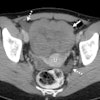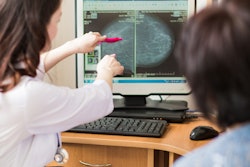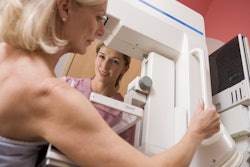Dear AuntMinnie Member,
Conference season is in full swing and AuntMinnie has you covered on the latest meeting presentations.
The American Roentgen Ray Society (ARRS) is currently holding its annual meeting in San Diego, CA, and it has not disappointed in dishing out the latest research and expert insights. One presenter discussed the challenges of managing “controversial” high-risk breast lesions diagnosed on core needle biopsy. Find out what she had to say in this edition’s featured story.
Also at ARRS 2025, researchers shared study results that showed that most women are OK with their mammogram data being used to calculate their lifetime breast cancer risk and that BI-RADS “report cards” can effectively reduce rates of BI-RADS 3 assessments.
In other conference news, in early April, the American Institute of Ultrasound in Medicine (AIUM) had its annual gathering in Orlando, FL. At the meeting, researchers discussed how lymphosonography can detect sentinel lymph nodes in cervical and vulvar cancer patients scheduled for surgery.
Meanwhile, the U.S. Supreme Court is hearing oral arguments on a case that has implications for no-cost preventive health services such as breast and lung cancer screening. Read about the case, Kennedy v. Braidwood Management, and what’s at stake as the authority of the U.S. Preventive Services Task Force (USPSTF) comes under fire.
We also covered a study conducted by a Polish team that found that displaced Ukrainian women have double the odds of having advanced-stage breast cancer compared with Polish citizens.
Recent research has also explored breast cancer screening trends among women. One study by a University of Wisconsin team found that female veterans are just as likely to undergo screening as nonveteran women, while another conducted by the American Cancer Society (ACS) suggested that breast cancer screening rates have recovered after declining during the COVID-19 pandemic.
The ACS also released its “2024 Annual Report to the Nation on the Status of Cancer,” which noted that overall deaths from cancer have been declining steadily in both men and women. However, it also reported that new cancer diagnoses have been increasing slightly every year among women.
More women are welcoming AI into their breast imaging exams, according to research by a University of Texas Southwestern Medical Center team. The investigators found that about seven out of 10 women approve of AI’s use as a second reader during screening mammography exams.
Finally, a South Korean team has reported that preoperative breast MRI did not improve recurrence-free survival or overall survival in patients with HER2-positive and hormone receptor-negative breast cancer.
Is there anything we've missed? Please feel free to drop us a line, and don’t forget to keep up with our Women’s Imaging content area for the latest news and updates!
Amerigo Allegretto
Associate Editor
AuntMinnie.com




















